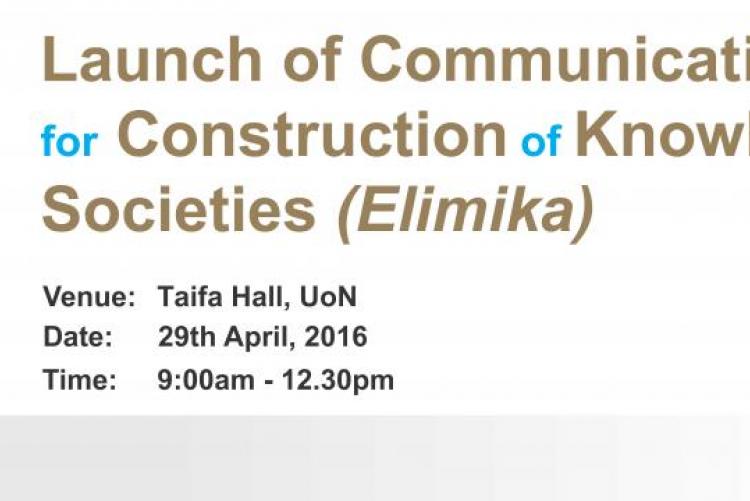“Construction of Knowledge Societies (Elimika) in Kenya” is a project of University of Nairobi which aims at empowering communities for wealth creation and prosperity.
The project is dubbed "Elimika" in Kiswahili. Its implementation is both innovative and adaptable and informed by the need to maximize avenues and strategies for creating knowledge societies. The initiative is collaborative, and embraces partnership with diverse institutions across the country. Some of the partners include the United States International University, Africa; Media Policy Research Centre; County Governments of Nairobi, Makueni, Turkana, Kwale and Homabay; Ministry of Education, Science and Technology; Ministry of Devolution and Planning; Commission for Revenue Allocation; former Commission for the Implementation of the Constitution; Ethics and Anti-Corruption Commission and the Ministry of Health; Catholic University of Eastern Africa; UNESCO, KNATCOM and The African Leadership Centre. This collaborative initiative seeks to embed the Constitution of Kenya (2010) in County Governments. The approach further entails working with the two levels of government, community organisations and development agencies. The project unpacks the concept of Human Rights, Governance, Leadership and Integrity, Devolution and Sustainable Livelihoods under the framework of Knowledge Societies. Specifically the project seeks to create knowledge in areas such as constitutional provisions; structures, mechanisms, and actors under the Kenya Constitution 2010; functions and mandate of the various actors; policies, legislations and mandates; roles, responsibilities and rights. The Initiative seeks to enhance communities’ ability to understand and apply concepts of human rights, governance, leadership and sustainable livelihoods. By addressing these concerns the Project aims at enhancing community organisation; comprehension and interpretation of the Constitution; upholding the rule of law, accountability and effective participation. The project is about nurturing knowledge societies. Broadly, “Elimika” aims at empowering communities in Kenya for wealth creation, leading to a prosperous, cohesive Nation. PROJECT FEATURES 1. Research This involves going out to the target communities, gathering information via household surveys, Key Informant Interviews and Group Discussions. The Baseline survey over the five counties involved over 2000 participants. 2. Dissemination of Information This has been accomplished in the four counties of Homa Bay, Makueni, Nairobi and Kwale. 3. Implementation The University is implementing the project in the counties. 4. Philanthropy In order to aid the research and implementation the project assists communities in promoting new technologies to support sustainable livelihoods. Ones such technology is an underground water tank which is an innovation of The Department of Environmental and Bio-systems Engineering, University of Nairobi. This has been implemented in Makueni and Kajiado. Music: the program supports alternative education methods; four artistes from Nairobi, Kwale, Homa Bay and Makueni have been identified to compose music on the project’s thematic areas. Internship: the project provides internships to university students with the aim of advancing their practical skills and helping with capacity building programs in the counties. Partial scholarships: In the spirit of constructing knowledge societies, the program is designed to award scholarships to university students. 5. Capacity building This stage addresses the gaps identified in the study as well as addressing the recommendations made in the baseline survey. It involves building partnerships with the Counties, Opinion Leaders and the Community to help construct knowledge societies. Artistes, interns and scholars form the core team that is used to conduct the capacity building exercise. 6. Monitoring & Evaluation This is meant to monitor and evaluate the project activities periodically so as to keep check on the achievements of the targets set for the project and map out challenges and way forward for the project during implementation. THE EVENT The anticipated event on 29th April, 2016 at Taifa Hall, University of Nairobi aims at bringing together the various stakeholders from the National, County governments and local communities in order to launch the communication strategy. The strategy is driven by ICT, local artistes, community theatre groups and indigenous communication methods. It will be an exciting moment for communities. WAY FORWARD The University is on the lookout for more partnerships and replicate the project in the remaining 42 counties.

